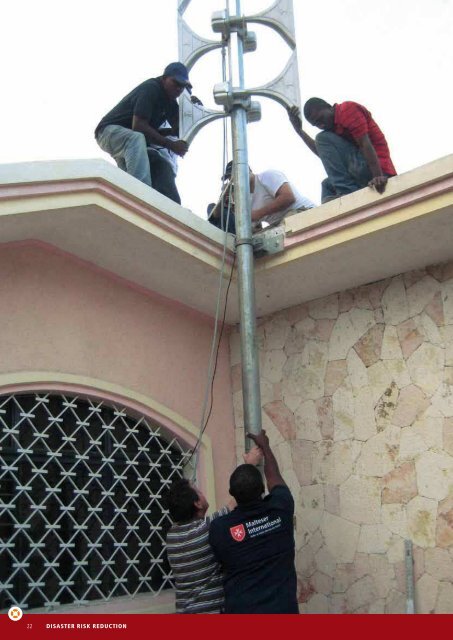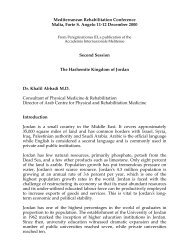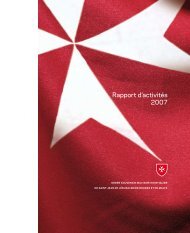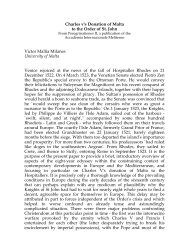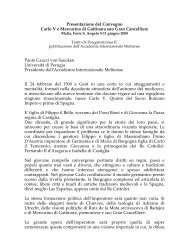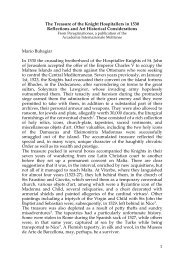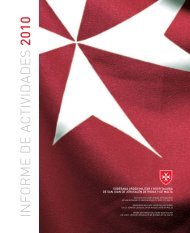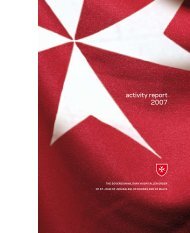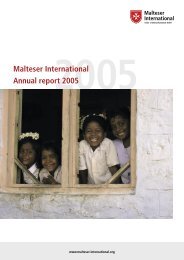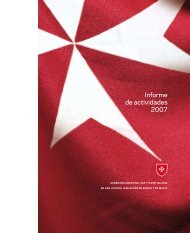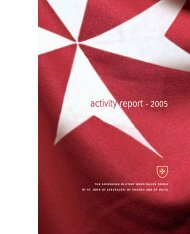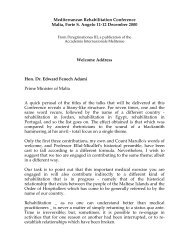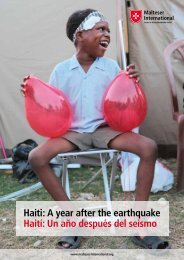Malteser International Annual Report 2009 - Ordine di Malta
Malteser International Annual Report 2009 - Ordine di Malta
Malteser International Annual Report 2009 - Ordine di Malta
Create successful ePaper yourself
Turn your PDF publications into a flip-book with our unique Google optimized e-Paper software.
FOCUS 4<br />
Disaster Risk Reduction<br />
Disaster risk reduction is an integral part of humanitarian assistance, both in relief and recovery, as well as in<br />
long term development initiatives. However, to date it has not always received the attention it deserves. With<br />
the climate change debate, the problems approaching the citizens of mega-cities and the increasing number of<br />
natural <strong>di</strong>sasters, there is a need to develop programmes addressing how to prevent natural phenomena from<br />
turning into <strong>di</strong>sasters, to mitigate their impact and help prepare increased numbers of people who may be at<br />
risk. Climate change, migration patterns as well as socio-economic pressure have forced more and more people<br />
into vulnerable living con<strong>di</strong>tions.<br />
Be it by the reinforcement of houses against earthquakes and cyclones, or by constructing flood safe emergency<br />
shelters or training village emergency teams and volunteers in the establishment of early warning systems, <strong>Malteser</strong><br />
<strong>International</strong> includes <strong>di</strong>saster risk reduction and mitigation components in many projects for people at risk.<br />
The focus is clearly on community based <strong>di</strong>saster risk management (CBDRM) and risk reduction aiming to support<br />
and to strengthen local coping capacities and to reduce vulnerabilities of people at risk. This new focus receives<br />
more and more attention: In May <strong>2009</strong>, a training on <strong>di</strong>saster risk reduction for staff members took place at the<br />
<strong>Malteser</strong> <strong>International</strong> Headquarters in Cologne/Germany. The <strong>Annual</strong> Meeting of Asia key staff in Siem Reap in<br />
Cambo<strong>di</strong>a in December <strong>2009</strong> also highlighted the importance of <strong>di</strong>saster risk reduction. <strong>Malteser</strong> <strong>International</strong><br />
implements <strong>di</strong>saster risk reduction projects in In<strong>di</strong>a, Mexico, Myanmar, Pakistan, the Philippines and Vietnam.<br />
Portrait of our h e lp<br />
Mexico – Being better prepared for future emergencies<br />
Since 1990, the Mexican Association of the Order of <strong>Malta</strong> has implemented nine <strong>di</strong>fferent programmes in the Federal District, the<br />
metropolitan area and 21 further states of the Mexican Republic. Carmen Reynoso started as a volunteer and became Director of<br />
“Orden de <strong>Malta</strong> México” ten years ago. With the support of around 2,000 volunteers, the Order in Mexico is active in the sectors<br />
of health, nutrition, income generation and emergency relief.<br />
Mexico – a country commonly hit by<br />
natural <strong>di</strong>sasters<br />
“The last heavy floo<strong>di</strong>ng in the state of Tabasco<br />
in October 2007 showed us how necessary it is<br />
to be prepared in the long term for the next catastrophe.<br />
At that time, hundreds of volunteers of<br />
the Order of <strong>Malta</strong> Mexico provided emergency<br />
relief in Villahermosa and the surroun<strong>di</strong>ng communities.<br />
Especially in this region, floods and<br />
hurricanes are very common occurrences”, Carmen<br />
Reynoso remembers. In November <strong>2009</strong>,<br />
Tabasco had to face another serious flood leaving<br />
250,000 people homeless. Together with its<br />
local partner Caritas Tabasco, the Mexican Association<br />
then <strong>di</strong>stributed me<strong>di</strong>cal and non-food<br />
items to the affected communities.<br />
“Apart from the management of our ongoing<br />
projects, we had to experience an increasing<br />
number of natural hazards all over the country<br />
– a fact that requires our commitment and<br />
sometimes overstrains our capacities to help,”<br />
the highly engaged Director points out. Carmen<br />
Reynoso is constantly out on business<br />
in the whole country monitoring the<br />
22 Disaste r Risk Reduction Disaste r Risk Reduction 23


